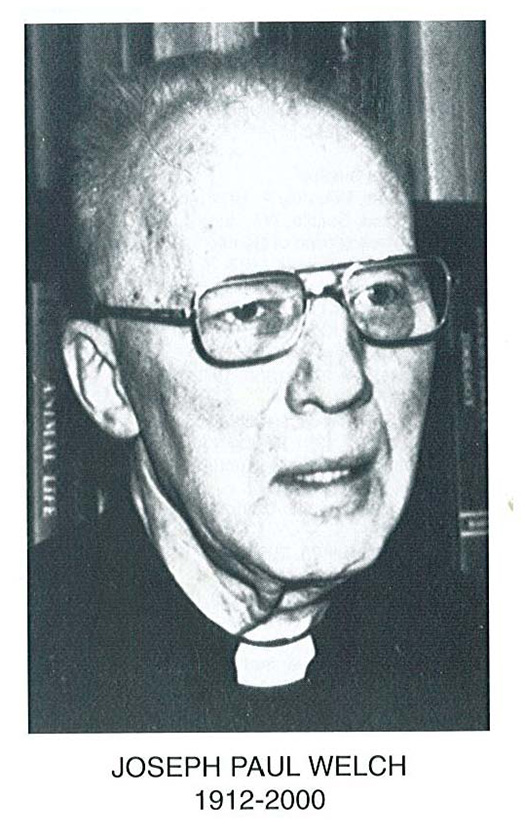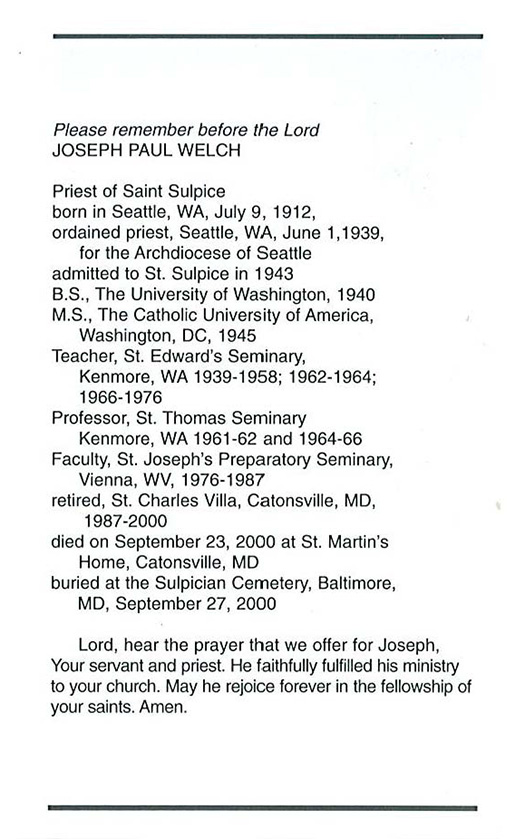Welch, Father Joseph Paul S.S.
2000, September 23
Date of Birth: 1912 , July 9
Saturday, June 3, 1939, was a very special day in Seattle. It was the day when the first ordination class from St. Edward’s Seminary in Kenmore, Washington, reached the priesthood. Five of that class were ordained that day by Bishop Gerald Shaughnessy, S.M., at St. James Cathedral. Together with their classmates from Portland, Spokane, Helena, and the Vicariate of Alaska, they had constituted what was known as the Twelve Apostles. One of the Seattle group was Cornelius M. Power, destined to be Chancellor of Seattle, Bishop of Yakima, and Archbishop of Portland, Oregon. Another was Joseph Paul Welch, known in official records as “Joseph P. Welch” but to his family and friends as “Paul.”
Long before that June day in 1939 Paul had heard the call of Christ to give up all to follow him and the Gospel. Born in Seattle on July 9, 1912, he was the son of Mary Lavinia Hoose and William Lee Welch of St. Edward’s Parish in Seattle. His father died in 1950, but his mother lived until 1968, when she died in a nursing home two years after suffering a stroke. The family home then became the rectory for St. Edward’s Parish, just across the street. Paul had two brothers, Thomas and Wallace, one of whom was an officer on a tramp steamer that very seldom docked in the port of Seattle; he also had a sister, Mrs. V.P. McGee in West Seattle. He visited her before he left Seattle for the last time in 1976, but she predeceased him, leaving a niece, Mrs. Patricia M. Kamber of Columbia, South Carolina, as his next of kin.
Paul spent his grade school years in St. Edward’s School and his freshman year of high school at Bishop O’Dea High School in downtown Seattle. Then in 1928 he left home for Mountain View, California, to enter St. Joseph’s College in its fourth year of existence. After two years of philosophy at St. Patrick’s Seminary, Menlo Park, California, he returned to Seattle in 1935 to enter St. Edward’s Seminary, which was in its fourth year of existence.
During those pioneering years at St. Edward’s he learned much from Father Thomas Mulligan, S.S., the first rector, and from the other priests who formed the first theology faculty. He also caught their desire to devote themselves to the work of priestly formation, and he became the first alumnus of the Sulpician Seminary of the Northwest to be released as a Sulpician candidate. With the oils of ordination still fresh on his hands, he was assigned to teach mathematics and science to the lower division students at St. Edward’s.
Because of wartime demands, Father Paul continued in his first assignment for three years. Then he was called back to Baltimore to make his year of Solitude at Old St. Mary’s Seminary in Baltimore under the direction of Father Lloyd P. McDonald, S.S., who was also rector of the philosophy house. With him in the Solitude that year were Fathers Vincent Eaton and William Thielemann, both of whom preceded him in death by only a few weeks or months. They were approved as members of the Sulpician Fathers in May of 1943. For the following two years Paul was assigned to the Catholic University of America in Washington, D.C., to pursue courses in chemistry and physics before returning to the only Sulpician assignment he ever had, St. Edward’s Seminary.
Over the years that followed, he continued to learn the lessons of giving up his own will for that of Christ and his superiors. His first courses were not in chemistry or physics, but in biology. “It’s one of the sciences,” said his superior, and so he taught it. He was asked to serve as infirmarian, and he did that for at least thirteen years. When Father Michael O’Neill became superior of the minor seminary, Paul inherited from him the task of faculty secretary, taking all the minutes of faculty meetings until St. Edward’s closed twenty years later. When there was no one to teach biology at nearby St. Thomas’ Seminary, he took that on for several years.
In everything he did, it was a matter of the will of Christ, as expressed by his superiors. At one point he had been skipping lunch, both because he felt he didn’t need it and because he could get more work done. But then his superior urged the confreres to be more faithful to attending community exercises. Paul asked whether that included meals. When the superior said “Yes,” Paul almost never missed another meal – on principle.
On holidays and in other free times Paul tended to spend a good bit of time in his room. When asked what he did then, he’d usually say, “I read my book.” That “book” often involved continuing education in his field, quite on his own. His “book” gradually grew to thousands of volumes with emphasis on reference works, books in the field of science, and ones in other areas as well. So large did his library become that he turned his collection over to serve as the basis for the library at St. Charles Villa, to which he retired in the summer of 1987.
When the new Archbishop of Seattle made the decision to close the minor seminary in 1976, Paul felt that at 64 he still had a few more years of service left in him. Thus, when he was invited to come to St. Joseph’s Seminary in Vienna, West Virginia, he got permission to accept the offer. He bought a car, the only one he ever owned, and drove cross-country alone to his new assignment. He expected to work there for a few years; it turned out to be eleven years – until St. Joseph’s in its turn closed in 1987. In the course of that time, he taught the sciences and gradually became almost the night watchman, checking the building to make sure that everything was in good order – and this he did night after night.
On one occasion when he had visitors in his room after supper, all of a sudden there was a frantic knocking at his door. A couple of freshmen called out, “Father, come quick; the Coke machine won’t work.” Paul calmly got up and followed them down the hall. He got out a tool to correct the problem and then returned to his visitors. He was at the service of all.
Early in his time in West Virginia, he wrote back to Seattle to get his credits for the state education authorities. He included a note to the former principal: “Should you add a high school transcript to this? If you should, could you? If you could, would you?” It was a sign of the underlying wit that surfaced only occasionally.
In 1987 Paul retired to St. Charles Villa in Catonsville, arriving in the same car that he had bought eleven years before. He gradually divorced himself from more and more of this world. Congestive heart failure left him increasingly weakened. He got rid of his car when he could no longer drive. He gave up his library when it came time to move out of St. Charles Villa for the 1999 renovations. And he spent those five months at the Little Sisters’ St. Martin’s Home. On our return it was decided to institute a daily social hour before supper to strengthen community spirit. Paul responded by coming every evening – sometimes as the first one there.
But as the weeks passed, those at the Villa could almost see Paul puzzling, like St. Paul, over the advantages of life vs. death. Like his saintly namesake, he was caught between the two. But always he knew that “the favors of the Lord are not exhausted; his mercies are not spent; they are renewed every morning” (Lamentations 3:22-23) – in the Eucharist that was the essential part of his every day. When he could no longer celebrate the early Mass each morning, he became a part of the concelebrated Mass at 9:30 – almost without fail.
Then on September 23, 2000, just a week after we buried his Solitude mate, Father Bill Thielemann, Father Paul Welch came to the end of his eighty-eight earthly years. He was waked at St. Martin’s Home, where he had spent his final days. On the morning of September 27, the same day that Father Joseph L. White died, the funeral Mass for Father Welch was offered at St. Martin’s. Provincial, Father Ronald D. Witherup was main celebrant with twenty confreres, and Father John Bowen was homilist. Finally, we laid him to rest in the Sulpician Cemetery, and we could almost hear the words that Paul had renewed so often in his sixty-one priestly years: Dominus pars haereditatis meae et calicis mei; tu es qui restitues haereditatem mean mihi. O Lord, it is you who are my portion and my cup; it is you yourself who are my prize. (Psalm 16:5)


